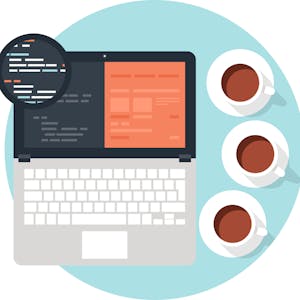Distributed Programming in Java
This course teaches learners (industry professionals and students) the fundamental concepts of Distributed Programming in the context of Java 8. Distributed programming enables developers to use multiple nodes in a data center to increase throughput and/or reduce latency of selected applications. By the end of this course, you will learn how to use popular distributed programming frameworks for Java programs, including Hadoop, Spark, Sockets, Remote Method …
Distributed Programming in Java
This course teaches learners (industry professionals and students) the fundamental concepts of Distributed Programming in the context of Java 8. Distributed programming enables developers to use multiple nodes in a data center to increase throughput and/or reduce latency of selected applications. By the end of this course, you will learn how to use popular distributed programming frameworks for Java programs, including Hadoop, Spark, Sockets, Remote Method Invocation (RMI), Multicast Sockets, Kafka, Message Passing Interface (MPI), as well as different approaches to combine distribution with multithreading.Why take this course?
• All data center servers are organized as collections of distributed servers, and it is important for you to also learn how to use multiple servers for increased bandwidth and reduced latency. • In addition to learning specific frameworks for distributed programming, this course will teach you how to integrate multicore and distributed parallelism in a unified approach. • Each of the four modules in the course includes an assigned mini-project that will provide you with the necessary hands-on experience to use the concepts learned in the course on your own, after the course ends. • During the course, you will have online access to the instructor and the mentors to get individualized answers to your questions posted on forums.
The desired learning outcomes of this course are as follows:
• Distributed map-reduce programming in Java using the Hadoop and Spark frameworks • Client-server programming using Java’s Socket and Remote Method Invocation (RMI) interfaces • Message-passing programming in Java using the Message Passing Interface (MPI) • Approaches to combine distribution with multithreading, including processes and threads, distributed actors, and reactive programming
Mastery of these concepts will enable you to immediately apply them in the context of distributed Java programs, and will also provide the foundation for mastering other distributed programming frameworks that you may encounter in the future (e.g., in Scala or C++).
None
Syllabus
Syllabus - What you will learn from this course
Week 1
Welcome to the Course!
DISTRIBUTED MAP REDUCE
Week 2
CLIENT-SERVER PROGRAMMING
Talking to Two Sigma: Using it in the Field
Week 3
MESSAGE PASSING
Week 4
COMBINING DISTRIBUTION AND MULTITHREADING
Continue Your Journey with the Specialization “Parallel, Concurrent, and Distributed Programming in Java”
FAQ
When will I have access to the lectures and assignments?
Access to lectures and assignments depends on your type of enrollment. If you take a course in audit mode, you will be able to see most course materials for free. To access graded assignments and to earn a Certificate, you will need to purchase the Certificate experience, during or after your audit. If you don't see the audit option:
The course may not offer an audit option. You can try a Free Trial instead, or apply for Financial Aid.
The course may offer 'Full Course, No Certificate' instead. This option lets you see all course materials, submit required assessments, and get a final grade. This also means that you will not be able to purchase a Certificate experience.
What will I get if I subscribe to this Specialization?
When you enroll in the course, you get access to all of the courses in the Specialization, and you earn a certificate when you complete the work. Your electronic Certificate will be added to your Accomplishments page - from there, you can print your Certificate or add it to your LinkedIn profile. If you only want to read and view the course content, you can audit the course for free.
Is financial aid available?
Yes. In select learning programs, you can apply for financial aid or a scholarship if you can’t afford the enrollment fee. If fin aid or scholarship is available for your learning program selection, you’ll find a link to apply on the description page.
Do I need to buy a textbook?
No. The lecture videos, demonstrations and quizzes will be sufficient to enable you to complete this course. Students who enroll in the course and are interesting in receiving a certificate will also have access to a supplemental coursebook with additional technical details.
How does the Multicore Programming in Java: Parallelism course relate to the Multicore Programming in Java: Concurrency course?
Multicore Programming in Java: Parallelism and Multicore Programming in Java: Concurrency cover complementary aspects of multicore programming, and can be taken in any order. The Parallelism course covers the fundamentals of using parallelism to make applications run faster by using multiple processors at the same time. The Concurrency course covers the fundamentals of how parallel tasks and threads correctly mediate concurrent use of shared resources such as shared objects, network resources, and file systems.
Reviews
Great course. The first programming assignment was challenging and well worth the time invested, I would recommend it for anyone that wants to learn parallel programming in Java.
Great experience and all the lectures are really interesting and the concepts are precise and perfect.
First two courses are better. This one is quick and a little vague
Great lectures. I really learned a lot about distributed computing.
Start your Free Trial
Self paced
20,185 already enrolled
4.6stars Rating out of 5 (466 ratings in Coursera)
Go to the Course
